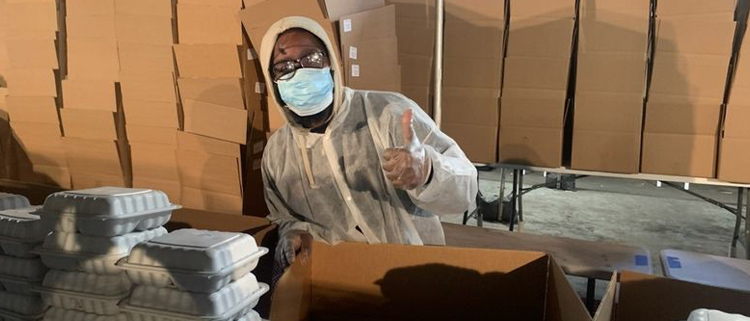![]()
by Jocelynne Rainey
Every day at 7 p.m., we go outside to cheer the people caring for us, feeding us and keeping our city running during the Covid-19 crisis.
I know some of these people firsthand. They are the young men I work with daily at Getting Out and Staying Out. GOSO is a citywide nonprofit helping incarcerated and justice-involved boys and young men, ages 16 to 24, connect to jobs, education, vocational training and mental health services.
Those workers are now handling some of society’s most essential duties. They deliver food, load boxes of medical supplies and replace soup kitchen workers who are elderly and at high risk of contracting the virus.
One young client named Unique, who recently was released from prison, is helping get thousands of meals each day to senior citizens and hospital workers. Another, Dave, delivers for FedEx throughout the city. A third, Isaiah, is putting in long hours as a grocery cashier. I’m proud of their work and gratified that our employer partners are connecting them with opportunities to make a living and help our city during this difficult time.
Prior to working at GOSO, I led workforce development at the Brooklyn Navy Yard, where we increased the percentage of formerly incarcerated employees from 10% to 20% in jobs including furniture manufacturing, metalwork and tech. At GOSO we have utilized the city’s Work Progress Program to fund 500 subsidized jobs in six years.
Initiatives like that one help businesses by providing subsidized labor while offering workers valuable experience and a paid job. When availed of such robust programs, only 15% of young men at GOSO have returned to jail, versus more than 65% nationwide.
We need more committed, creative employers, like Dos Toros restaurants, Rusk Renovations and Vamoose Bus. And we need nonprofits, like the Horticultural Society and Carnegie Hill Neighbors, which were hiring formerly incarcerated and justice-involved young men even before the Covid-19 crisis began.
I commend Great Performances, which has pivoted from catering at The Plaza hotel and Jazz at Lincoln Center to working with the city to provide meals for senior citizens. And it is adding young men who have been incarcerated to its staff to aid in its efforts—with excellent outcomes.
Covid-19 is making life all the more dangerous for all incarcerated individuals, some with health issues, who should already be availed of justice options beyond the cellblock. Those who are released, often to neighborhoods hit hardest by the virus, are facing higher rates of homelessness, joblessness and hunger than ever. It is in every New Yorker’s interest to ensure that all who are released have the opportunity to achieve stability.
Gov. Andrew Cuomo has said that young, healthy workers are needed to reopen the state. Mayor Bill de Blasio has called for the city’s reopening to be fair and just. A plan for a just reopening must include pathways for formerly incarcerated and justice-involved people to fully participate. Workforce programs are just a fraction of what is needed, but for those able to work, they are a lifeline.
The key to keeping our city safer and our communities stronger is not incarcerating more young men. It is creating more innovative opportunities for education and jobs, to allow these willing workers to be the heroes that we desperately need now and will continue to need as we reopen and rebuild.
Dr. Jocelynne Rainey is president and CEO of Getting Out and Staying Out, a re-entry, youth and career-development nonprofit that services justice-involved boys and young men ages 16 to 24.
Read this article at Crain’s New York Business.

